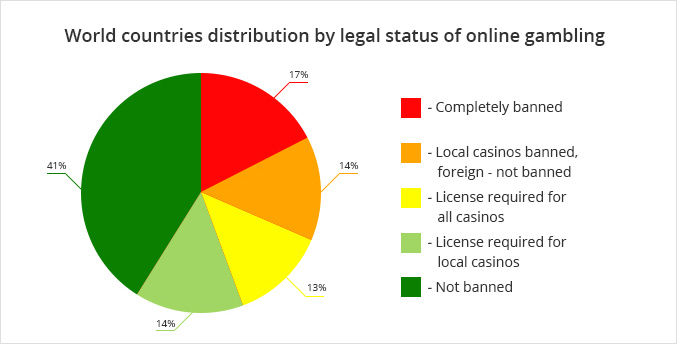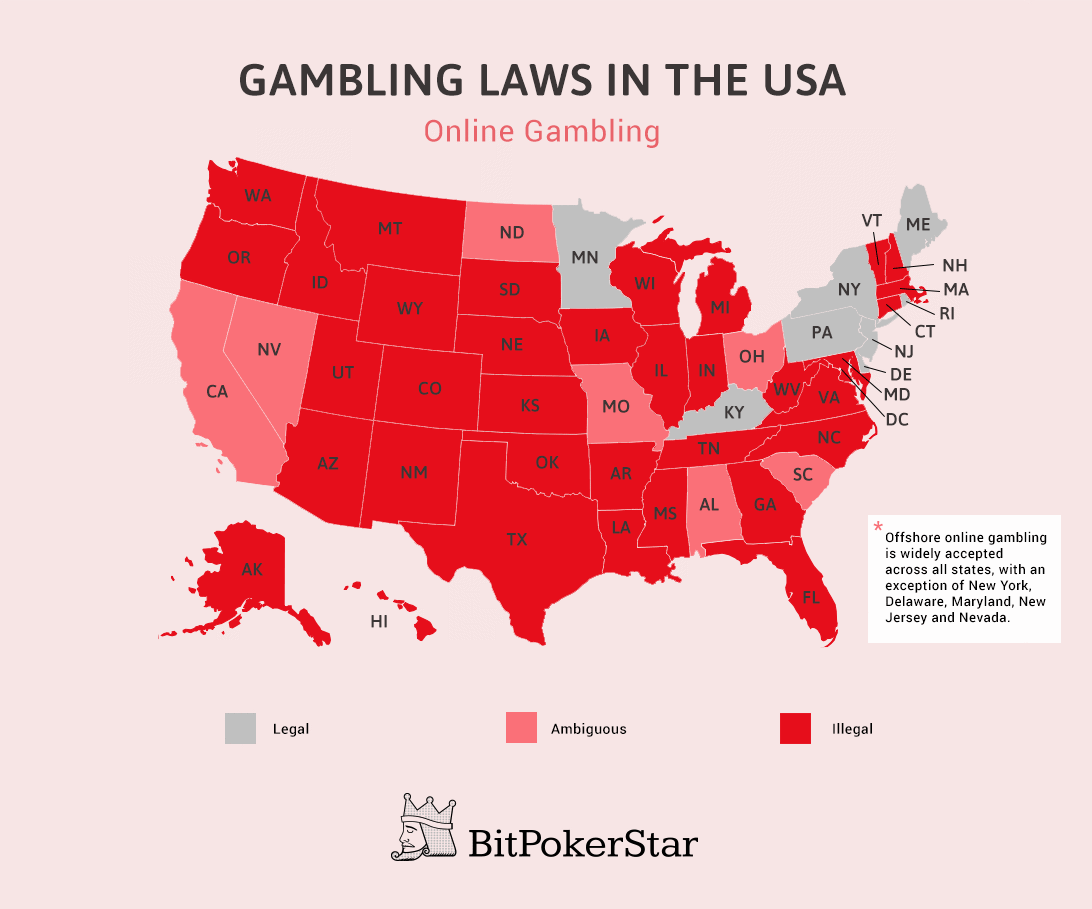States That Have Already Legalized Online Gambling May 25, 2019 Senator Arlan Meekhof Government, Legislation For now, four states have approved the legalization of the operation of online gambling sites and services within the boundaries of the United States. Dec 08, 2020 Nevada, New Jersey, and Delaware were among the quickest to react by adopting online poker, casino games, or both. Seven years later, in May 2018, the Supreme Court ruled out PASPA, allowing the.
Home» US Poker Laws » State Laws
The gambling laws of US states are best collectively described as a mashup, a tangle of differing philosophies, definitions and priorities.
Below you'll find a quick synopsis of gambling laws in each US state, along with a link to a detailed report for every state. Each review provides a plain-language interpretation of the state's gambling laws, an analysis of the legal status of online gambling and poker in general in the state.

The US state gambling laws include a review of recent developments relevant to online poker players. The state pages on this site are updated often to reflect the most recent developments for legal poker in the USA.
To help you navigate this page better, we've provided an interactive map. Simply click on a state within the map and the page will load that particular section for you.
States That Have Legalized Online Gambling Legal
Alabama Poker: State allows very limited types of gambling and considers poker to be gambling. Severe punishments for both players and operators. State law does not directly mention online gambling.
Alaska Poker: No lottery and very little regulated gambling in this state. Poker could qualify as game of skill, but case law suggests it is considered gambling. No specific law regarding gambling over the Internet.
Arizona Poker: One of a handful of states that expressly prohibits online gambling. Several forms of regulated gambling available. State law (and enforcement) primarily targets those who profit from illegal gambling activity.
Arkansas Poker: Broad definition of illegal gambling. Some parts of state law may have direct applicability to online gambling. Individual gamblers are not a focus of criminal charges related to illegal gambling.
California Poker: Offers a variety of regulated gambling options. No specific law addressing the issue of online gambling. Seems close to passing some sort of regulation, likely poker-only.
Colorado Poker: Expansive definition of gambling underpins strict approach to unregulated gambling. Poker is considered gambling. While law does not address online gambling specifically, state officials contend such gambling is illegal.
Connecticut Poker: Poker specifically mentioned in statutory definition of gambling. No law dealing directly with Internet gambling or online poker. Home poker games legal if no rake is taken.
Delaware Poker: Recently passed law to regulate some forms of online gambling. Players face only minor criminal exposure for participating in illegal gambling.
Florida Poker: Poker hotbed has very restrictive anti-gambling laws. Very few ways to play poker or gamble and be within the letter of Florida law. State has seen a handful of failed attempts to regulate online poker.
Georgia Poker: Poker players have almost no regulated - and therefore no legal - options for real money poker. State has constitutional ban on almost all forms of gambling.
Hawaii Poker: No regulated gambling of any sort in the 50th state. While online gambling not addressed directly, several aspects of state law could still apply. Individual gamblers not a primary target.
Idaho Poker: Possibly the broadest definition of gambling in the US. Poker directly mentioned. Online gambling possibly addressed by constitutional prohibition on gambling. Penalties relatively minor for players and operators.
Illinois Poker: Broad selection of regulated gambling and severe approach to unregulated gambling. State law specifically prohibits the operation of an online gambling site, but not necessarily playing at one.
Indiana Poker: State takes aggressive approach to illegal gambling. Players appear to be targets along with operators. Indiana has a law outlawing the operation (but not the use) of online casinos.
Iowa Poker: Does not draw a clear distinction between participants and operators. Severe potential penalties for both. State seems poised to pass some sort of online gambling regulation soon.
Kansas Poker: A litany of regulated options contrasts with a strict approach to unregulated gambling. State lottery oversees commercial casinos, a unique arrangement. No apparent momentum for online gambling regulation.
Kentucky Poker: Has legal online betting on horse racing. Practically zero criminal risk for those who merely participate in illegal gambling, but substantial exposure for those who profit from or otherwise advance such activity.
Louisiana Poker: Vague definition of gambling creates legal uncertainty. State law does specifically prohibit gambling online or running online gambling business.
Maine Poker: No penalties for mere players who take part in illegal gambling. Home poker games legal under Maine law. No direct mention of online gambling or online poker.
Maryland Poker: Gambling law differs county-to-county. Generally stiffer potential penalties for players than average. No direct reference to online gambling, but Maryland law has been to used to prosecute several operators.
Massachusetts Poker: Very broad definition of illegal gambling. Players face substantial charges in theory, but enforcement efforts do not appear to target players. No specific law covering gambling over the Internet.

Michigan Poker: Operators and players alike face harsh penalties in Michigan, which specifically identifies poker as a form of gambling. Internet gambling not addressed directly by any part of the law.
Minnesota Poker: State provides some forms of regulated gambling. Poker is likely considered gambling. Home poker games are excluded from anti-gambling law given that no one profits from running the game.
Mississippi Poker: Poker specifically identified as gambling. Minor penalties for those who are only players in illegal gambling activities. No part of Mississippi law deals specifically with Internet gambling.
Missouri Poker: Possibly the most severe penalties for players of any state in the nation. Lacks any law constructed to deal with online poker, but state officials assert such gambling is illegal under existing law.
Montana Poker: Law expressly prohibits online gambling but seems primarily focused on operators and not players. Otherwise, both players and operators involved in illegal gambling face stiff penalties.
Nebraska Poker: Difficult to identify a way in which playing poker for money could be legal in Nebraska. Little to no apparent interest in regulating online poker or online gambling.

Nevada Poker: First in the nation to issue licenses to online poker operators. Anti-gambling laws almost exclusively focused on those running illegal gambling operations and not on mere players.
New Hampshire Poker: Fairly narrow definition of gambling that may or may not include poker. State law doesn't appear to cover online gambling directly.
New Jersey Poker: Plenty of regulated gambling options available in New Jersey. State appears close to passing online poker regulation (and perhaps a larger package of online gambling regulations).
New Mexico Poker: A very broad definition of illegal gambling but no direct mention of online gambling or online poker. Home poker games apparently illegal under state law.
New York Poker: State anti-gambling laws formed heart of Black Friday indictments. Home poker games allowed. Despite Black Friday role, no mention of online gambling in state law. Players face little risk or liability in New York.
North Carolina Poker: No definition of 'game of chance' creates confusion in state gambling law. Relatively weak penalties for anti-gambling law violations. State may soon regulate so-called 'Internet sweepstakes' cafes.
North Dakota Poker: Very broad definition of illegal gambling, but little apparent enforcement. Has some potential to regulate online gambling in the near term. Home poker games legal or illegal based on stakes involved.
Ohio Poker: Poker specifically defined as 'game of chance.' Home games legal at any stakes. State seems to have significant likelihood of regulating online gambling in near term.
Oklahoma Poker: Tons of regulated gambling options, but very stiff penalties for unregulated gambling. Transmission law may cover Internet gambling.
Oregon Poker: Law specifically prohibits financial transactions related to internet gambling. Poker for real money legal in a variety of regulated formats.
Pennsylvania Poker: Players in illegal gambling activities face no liability. State has somewhat confused approach to gambling thanks to lack of clear statutory definitions. Online gambling regulation seems fairly likely in next two years.
Rhode Island Poker: Ambiguous gambling law but players do not appear to be targets of the law or enforcement efforts. Rumored interstate poker partner for Delaware.

South Carolina Poker: State Supreme Court will soon decide if poker is a form of gambling. Centuries-old laws regarding gambling still on the state's books make many common games such as Monopoly technically illegal.
South Dakota Poker: Very aggressive approach to illegal gambling. Very broad definition of what activity constitutes illegal gambling. State law explicitly criminalizes operation of online gambling businesses.
States That Have Legalized Online Gambling Laws
Tennessee Poker: More or less prohibits all forms of gambling, save the state lottery and some forms of charitable gambling. Law does not directly tackle online gambling.
States That Have Legalized Online Gambling Legislation
Texas Poker: Significant factions of state government and the public vociferously opposed to gambling. Utilizes very broad definition of gambling that includes betting on any activity involving any chance.

Utah Poker: No regulated forms of gambling. Pre-emptively opted out of any federal law regarding online poker in 2018. Least likely of the 50 states to regulate online poker or gambling.
Vermont Poker: Relatively limited law regarding gambling. Minor penalties and low-priority enforcement for individual gamblers.
Virginia Poker: State takes what amounts to an average approach to anti-gambling laws and enforcement. No law specifically designed to cover online gambling.
Washington State Poker: Only state to make placing a bet online a felony. State allows a wide variety of regulated gambling options, including commercial and tribal casinos.
West Virginia Poker: State allows wide array of regulated gambling. Minor penalties for players engaged in illegal gambling. Frequently mentioned as potential interstate online poker partner for neighbor Delaware.
Wisconsin Poker: Home to a handful of regulated gambling options. Fairly strict laws regarding unregulated gambling and higher-than-average arrest numbers for such charges.
States That Have Legalized Online Gambling Sports Betting
Wyoming Poker: Very broad definition of illegal gambling. One of a few US states to not have a lottery. Relatively minor penalties for engaging in illegal gambling.
States That Have Legalized Online Gambling Winnings
District of Columbia Poker: Home to nation's capitol and an attempt to regulate online gambling that failed in 2018. Anti-gambling laws relatively limited.